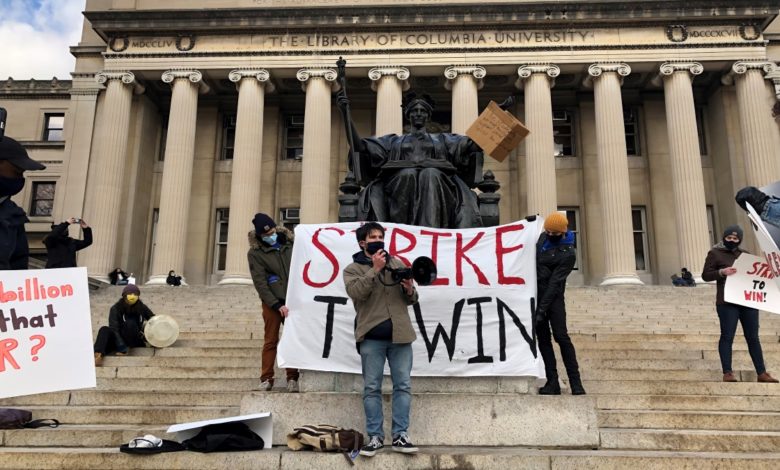
Owen Park is a student at Columbia University and participant in the strike; Grant Miner is a PhD student at Columbia and a member of the Graduate Workers Union, which supports the strike.
On Jan. 22, the deadline for Spring semester payments, Columbia University students officially began a campus-wide tuition strike. They are calling it the largest of its kind in United States history with over 4,000 pledged participants.
This action, chiefly organized by Columbia’s chapter of the Young Democratic Socialists of America (YDSA), had been in the works since last summer as a response to unsatisfactory administrative adjustments to the COVID-19 pandemic, including university President Lee Bollinger’s refusal to reduce his $4.6 million annual salary in the interest of increasing student aid. The movement gained further momentum in the Fall 2020 semester with national media coverage and a broad base of support from other student groups, such as Students for Justice in Palestine and Mobilized African Diaspora.
“This larger question of education during COVID laid bare the ways that Columbia ignores its students,” says YDSA organizer Willem Morris. “Not to mention that they’re not accountable to their surrounding communities.”
Since the beginning of the academic year, the 2021 Columbia Tuition Strike has expanded its focus beyond campus affairs, growing into a multifaceted rejection of the university’s pattern of injustice on the citywide and even global stage. Organizers have leveraged their collective power over the university by making a broad set of demands, which includes a 10 percent reduction in the school’s exorbitant $61,700 yearly tuition and increased financial aid. The demands also include that the university defund their campus safety department, divest from fossil fuels and Israeli apartheid, bargain in good faith with the Graduate Workers Union, and honor their commitments to Harlem residents displaced by the university’s Manhattanville Campus Project.
Columbia, whose campus safety office recruits from the New York Police Department, has worked with police in recent years on a multi-million dollar surveillance campaign in order to make way for a new $6.3 billion campus in the predominantly Black neighborhood of Harlem. The campaign has resulted in the unjust arrest of over 100 Harlem residents. In this and other initiatives, the university has made clear that their safety department and overall financial decision-making works not in the interest of students’ wellbeing, but in that of the administration’s greedy and violent occupation throughout the land surrounding campus.
Organizers held a press conference on Jan. 17 to express support for the strike in front of President Bollinger’s mansion.
The campaign has already seen a victory. On the same day that tuition withholding went into effect, Columbia conceded to one student demand by vowing a full divestment of endowment funds from fossil fuels.
However, as of Jan. 24, the university began financially retaliating against student strikers by compounding late fees on unpaid tuition bills, despite promising the suspension of these additional charges in weeks past. Despite such challenges, the strike continues, underscoring capitalism’s disrespect of human rights in housing and education. Support the 2021 Columbia Tuition Strike by donating to help striking students pay Columbia’s mounting retaliatory fees: https://www.gofundme.com/f/columbia-tuition-strike-solidarity-fund





